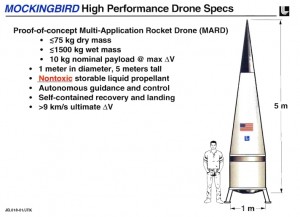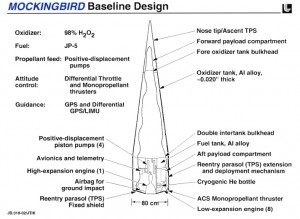Designed in the early 1990’s at Lawrence Livermore National Labs by Jordin Kare, the “Mockingbird” was a conceptual design of a single stage rocket vehicle. It was to be relatively cheap, as befits a vehicle designed officially to serve as a target. Replicating the trajectory of ballistic missiles, it was to serve as the target for ballistic missile defense systems.
But it was found that, if design properly, the simple target vehicle could do some rather more interesting things than simply get blasted. With a very lightweight aluminum rocket engine burning a combination of hydrogen peroxide and JP-5, performance in terms of thrust and Isp would be fairly high, and bulk vehicle density would also be quite high. It would, in fact, be just barely possible that this modest target vehicle would be able to attain low Earth orbit with a payload of 10 kilograms… hence the nickname “bricklifter.” Empty weight would be 75 kilograms; light enough to be picked up be two men.Gross weight would be 1500 kilograms; light enough to be carried by a largish pickup truck. And small enough that it could potentially be launche from the back of a smallish pickup truck.
Included in that 75 kilograms was re-entry shielding to allow the Mockingbird to survive re-entry, landing gear and enough rocket propellant for a soft touchdown. It was, essentially, a minimum-size Delta Clipper.
Like just about everything in aerospace, it likely would have come in over budget and over weight. But as the likes of Xcor, Armadillo Aerospace and Masten Space Systems have shown, relatively small groups on shoestring budgets (by government standards) can, with time and effort, develop just the sort of technologies needed to make vehicles like the Mockingbird work. And if one of these companies can actually build a SSTO on the scale of the Mockingbird… boy howdy, the Air Force should be *desperately* interested. Sadly, so will the regulatory agencies. But private citizens building orbital vehicles they can launch from their trucks? Awesome.
UPDATE:
An article on the Mockingbird was included in US Launch Vehicle Projects #2, available HERE.


